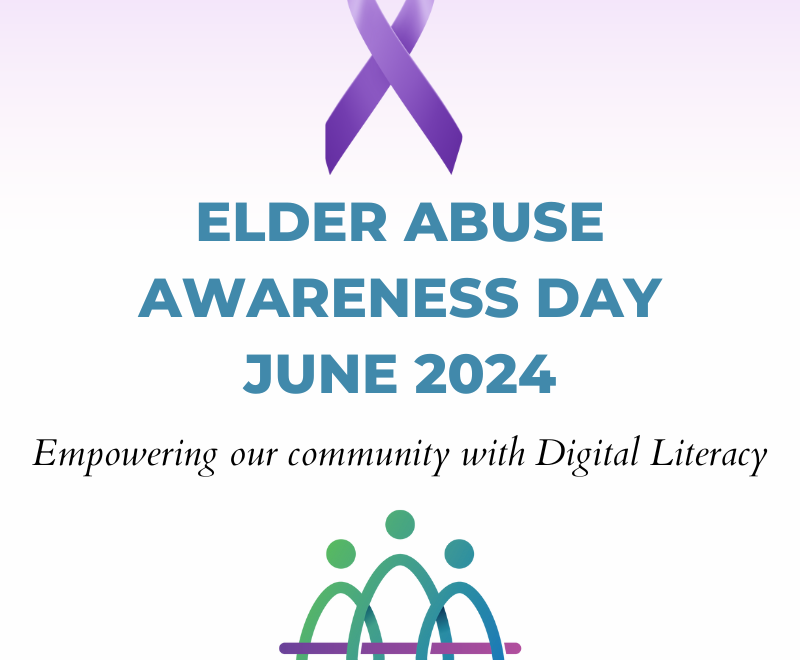World Elder Abuse Awareness Day (WEAAD) is an important day dedicated to raising awareness about the abuse and exploitation that many older adults face worldwide. Established by the International Network for the Prevention of Elder Abuse and the World Health Organization at the United Nations, WEAAD serves as a crucial reminder of the need to protect our aging population from various forms of abuse, including financial exploitation and online scams.
The Importance of Awareness
As the digital world continues to expand, older adults are increasingly targeted by scammers looking to exploit their lack of familiarity with technology. Financial abuse and scams are particularly harmful, as they can drain seniors’ life savings and leave them vulnerable. Raising awareness about these issues is essential to protecting our seniors and ensuring they can enjoy their golden years with peace of mind.
Fostering Awareness Through Digital Literacy
At Bridge The Digital Divide, we understand the importance of equipping older adults with the knowledge and skills they need to navigate the digital world safely. Our month-long workshop, “How to Avoid Online Scams,” was specifically designed to empower our elders. During this workshop, our students learned to identify the warning signs of scams, understand common scam tactics, and take proactive steps to protect themselves.
Highlights of the Workshop
Throughout the workshop, we covered a range of topics to help seniors stay vigilant against online scams:
- Recognizing Phishing Emails:
– We taught our students to be wary of unsolicited emails that ask for personal information or direct them to click on suspicious links. We emphasized the importance of verifying the sender’s identity and never sharing sensitive information via email.
- Avoiding Tech Support Scams:
– Using resources from the Federal Trade Commission (FTC), we highlighted the common tactics used by tech support scammers. Scammers often pretend to be from well-known companies, like Microsoft or Apple, and claim there is a problem with the victim’s computer. We stressed that legitimate tech support companies will never ask for payment or personal information upfront and that seniors should always contact the company directly using official contact information found on a bill or receipt.
- Spotting Fake Websites:
– We demonstrated how to identify secure websites by looking for “https://” and the padlock icon in the browser’s address bar. We also discussed the importance of navigating to websites directly rather than clicking on links in unsolicited email or text messages.
Protecting Older Adults from Financial Abuse and Scams
In addition to our workshop, we encourage older adults to take the following steps to protect themselves from financial abuse and scams:
- Stay Informed:
– Keep up to date with the latest scam tactics by subscribing to newsletters and alerts from trusted organizations like the FTC.
- Use Strong, Unique Passwords:
– Create strong passwords for online accounts and use different passwords for each account. Consider using a password manager to keep track of them securely.
- Enable Multi-Factor Authentication (MFA):
– Whenever possible, enable MFA on your accounts to add an extra layer of security.
- Monitor Financial Statements:
– Regularly review bank and credit card statements for any unauthorized transactions. Report suspicious activity immediately.
- Limit Sharing Personal Information:
– Be cautious about sharing personal information online and over the phone. Verify the identity of the person or organization requesting information.
- Report Scams:
– If you encounter a scam or fall victim to one, report it to the FTC and your local authorities. Reporting helps prevent others from being scammed.
Conclusion
World Elder Abuse Awareness Day is a vital reminder of the need to protect our seniors from abuse and exploitation. By fostering digital literacy and raising awareness about online scams, we can empower older adults to stay safe and secure in the digital age. At Bridge The Digital Divide, we are committed to providing the education and resources necessary to help our aging population navigate the online world with confidence.
For more information on how to spot, avoid, and report tech support scams, visit the FTC’s guide [here]. Together, we can make a difference in the lives of our seniors and protect them from harm.

